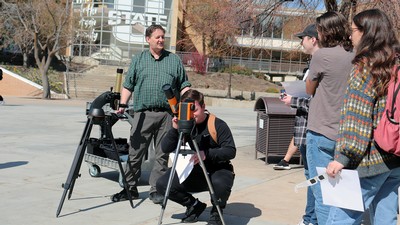USU Research on the Effects of Emotion Yields Unexpected Results
Research on emotion’s effect on the perception of time has confirmed what novels have been saying all along: a stressful incident seems to last a lot longer than it really did, while a happy experience seems to go by a lot faster.
A team of three researchers from Utah State University’s Psychology Department recently studied whether emotion also distorted perceptions of numerosity. They hypothesized that people who saw multiple angry faces would overestimate the number of scowling images.
Instead, said associate professor Kerry Jordan, they were surprised to discover that their test subjects underestimated the number of angry faces they saw — though they underestimated the number of neutral and happy faces a little more.
The USU team published its findings over the summer, in the journal Frontiers in Psychology. Authors included Joseph M. Baker, Katrina S. Rodzon and Jordan. A different group of researchers from Boston College independently reported similar results earlier this year.
“It’s very interesting to see an unexpected result replicated,” Jordan said.
In the USU study, test subjects were shown between six and 24 faces for one second, then asked if the number of faces they saw was more similar to 6 or 24. The 33 people in the sample consistently underestimated the number of faces, though the underestimation was less extreme for angry faces. There was no discernible difference between the responses of men and women.
“It’s still a little difficult to explain,” Jordan said.
They expected the angry faces to induce stress, which has been shown to trigger fight-or-flight responses like an increased heart rate and dilation of the pupils. The theory was that the heightened stress would also heighten the perception of the threat.
Instead, maybe attention was so drawn to the emotion that the subjects weren’t as good at enumerating the faces.
“It is evolutionarily beneficial to attend to emotional stimuli in our environment that may potentially be helpful or harmful,” Baker said. “However, attending to a specific object means that others may be missed. When it comes to enumeration, missing objects will yield underestimations. Our results may be evidence of this.”
Future studies will thus be necessary to determine whether the perception of time and number are always affected in different ways by emotion. A better understanding of how emotion alters human processing of quantity could help professionals understand dysfunction. For example, people with anxiety often experience altered time perception.
Related links:
USU Emma Eccles Jones College of Education and Human Services
Contact: Kerry Jordan, (435) 797-2797, kerry.jordan@usu.edu
Writer: JoLynne Lyon, 435-7976-1463
Dr. Kerry Jordan and a team of researchers studied whether emotion also distorted perceptions of numerosity. The results were unexpected.
TOPICS
Research 878stories Psychology 44storiesComments and questions regarding this article may be directed to the contact person listed on this page.






